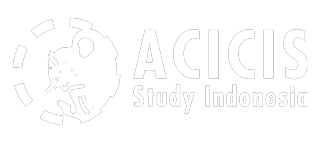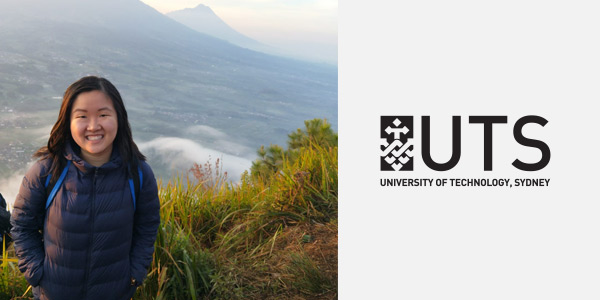Hwei-See Kay is a New Colombo Plan Scholar from the University of Technology Sydney. Hwei-See undertook the Indonesian Business, Law and Society Program at the Islamic University of Indonesia in Semester 2, 2018. She also recently completed the Indonesian Language Short Course, and is set to undertake the Law Professional Practicum in January.
Q: Why did you decide to undertake ACICIS’ Indonesian Business, Law and Society Program?
I always knew that I wanted to go on exchange during my undergraduate degree but I didn’t know where to go. Throughout my degree I did a couple of short programs in Thailand and Vietnam and really loved them. These experiences, combined with the support from the New Colombo Plan Scholarship, motivated me to look into exchange in Asia. ACICIS’ IBLS program was one of the few options I had to gain credits towards my law degree and go on exchange in South East Asia. My university’s international office also recommended going on exchange through ACICIS because of the in-country support they provide.
Q: Did you receive a New Colombo Plan Mobility Grant or Scholarship? If so, how did this contribute to your experience in Indonesia?
I received a 2018 New Colombo Plan Scholarship. The scholarship has made it easier for me to undertake ACICIS programs focused on language learning (ILSC), interning (LPP), and university exchange (IBLS). The scholarship has also motivated me to take every opportunity to learn about and contribute to the relationship between Australia and Indonesia. This has so far involved presenting at my host university’s student conference and attending conferences about international relations. I’ve also attended some events hosted or supported by the Australian Embassy in Indonesia.
Q: What classes/units are you currently enrolled in?
I am enrolled in 6 subjects at UII in the Faculty of Law: Law and International Relations, Human Rights Law, International Environmental Law, International Law of the Sea, Islamic International Law, and Crime and Victimology. As I am enrolled in the international program at the faculty, I wanted to focus on subjects concerning international law. All the content in these subjects is extremely interesting and I do still learn about Indonesian law as the implementation of international law into national law is always covered as part of the international law subjects.
Q: How would you describe your in-country study experience so far, particularly studying at UII?
Studying at UII is a world away from my experience of studying in Australia. The International Program in the Law Faculty (where classes are taught in English) has a small and close-knit cohort of students. Everyone is very involved in university life, and the lecturers and students all know each other. The content and class structure is very flexible, which took some getting used to, but is a very normal part of student life in Indonesia.
Q: Are you involved in any clubs/societies at the university?
I’m not involved in university clubs but have attended a few AIYA (Australian Indonesian Youth Association) events and presented at a university conference (see below).
Q: Are you participating in a seminar, symposium or conference in Indonesia?
I presented at the UII international law students conference with Kate Thresher, another ACICIS student and New Colombo Plan Scholar. We presented on freedom of speech in Australia. I have also attended the Conference on Indonesian Foreign Policy in Jakarta and the inaugural World Indonesianists’ Forum: The Role of the Millennial Generation in Bali, organised by the Indonesian Ministry of Foreign Affairs.
Q: How will the knowledge and experience of Indonesian business, law, or society gained through this program influence your future career or study?
As Australian organisations increase their interest and interaction with Indonesia, my experience in the program has helped me understand what systems are like, how relationships are formed and maintained, and the diversity of Indonesia. Essentially we are experiencing how things are done (and how things get done) in a totally different environment and culture. I’m not entirely sure how this will influence my future career or study, but I think the skills gained observing and adapting to these differences will be valuable in any situation.
Q: How has your understanding of business, law or society changed as a result of your experience on the Indonesian Business, Law and Society Program?
Before starting the program, I knew next to nothing about Indonesian law. Learning about the pluralist legal system in Indonesia has encouraged me to reflect on the Australian legal system, including about its limitations. Completing the program has vastly improved my ability to notice the legal and societal practices that we take for granted as normal or universal.
Q: Are you undertaking an internship or volunteering while in Indonesia?
I am undertaking an internship with Project Child Indonesia, a local NGO that provides education programs to children about their environment, health and society.
I decided to not undertake this internship as part of my IBLS program in order to take advantage of more flexibility with going into the office and more flexibility regarding research topics. I have so far conducted research on internet literacy education and assessing project-based learning. After completing the IBLS program I will start that LPP program in Jakarta, which involves interning with LBH Jakarta (a legal aid organisation).
Q: What do you like to do in your spare time in Yogyakarta?
I spend a lot (maybe too much) of spare time in cafes with great coffee, food and friends. I have gone to the movies more in my time in Yogya than my last two years at home because tickets are less than $4. Occasionally I also like to do indulgent things like go to a day spa or get a hair treatment.
Q: What places in Indonesia have you visited during your semester so far?
So far I’ve visited Karimunjawa, Banyuwangi (to see Ijen), Bali, Surabaya, Semarang, Jakarta and a couple of beaches south of Yogya.
Q: What is your favourite Indonesian food? Where is your favourite place to eat?
Jamur crispy and tempe bakar are reliably tasty everywhere, but Waroeng SS is my favourite place to get them.
Q: What is your favourite Indonesian word/phrase?
“Dari mana?” is almost always the first thing someone will ask when they meet you. “Where are you from?” isn’t something I looked forward to answering when I first arrived in Indonesia, partly because it can have negative connotations when I’m asked the same question at home and partly because my answer (in any language) is a bit complicated. Having to answer it multiple times a day really challenged me to relearn my associations with the question and is something that I’ve learned to love. I realised its something Indonesian people ask each other (not just foreigners) all the time because of the diversity in Indonesia and people’s (sometimes) complex family histories. It’s an easy conversation starter, which is never a bad thing, and helps me practice more Bahasa Indonesia.


